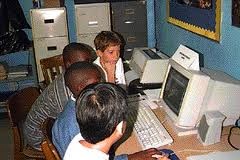" Building Teaching Skills Through the Interactive Web " Wow ! I started reading the first mail that our core instructor sent us and I realized I was going to be involved in a real adventure. Where should I begin? The blog! Oh yes! I had heard about blogs. I had seen many of them posted and I had even read some of them. But having my own one... ? This certainly was a challenge.I had a helpful handout in my hands but I still was not sure. What if I made a mistake ? Or if I spent so much time on this leaving even more interesting matters aside ?
I asked for help to my colleagues at school , the week before my summer holidays started, and it was good ! They were really helpful. I asked for help to our instructor, I tried on my own again and it was great! I ended up by having " two " at the end and a draft ( I guess the last one cannot be counted here ) I have one where I only posted about the first week and this final blog. That was the first lesson that I learned : To diminish the level of anxiety. To teach myself the same things we always teach to our students : To trust oneself and the people around you, to have the conviction that, if you are really into something, you can accomplish your goal, even if it looks hard at the beginning. And I did ...
My second task was to learn to organize myself, to try a routine for a couple of days and see if it worked well. If not, I would try another one. To organize one ' s work was useful for me. I gave all readings and assignments the same degree of importance, so I needed to make the best use of my time to fullfil the requirements of the course. At the end, I can only say that I do not know if I did everything right, I just know that I was there.
Deciding on the level, was another issue, too and I must confess that I kept changing my decision quite often. Older or younger students ? Finally, I made up my mind and chose my younger students at school ( I dedicated a task to the university students, too though ) When I narrowed my search, I started searching information and focusing my readings on " elementary students " but I did not leave aside a lot of interesting data I found for older learners, too. Our biggest goal ? The final project. As I was working on it, I was trying to imagine my students in the different situations I added : The pronunciation tool, the online games and a final small blog based mainly on pictures, that I planned for them. This course based on technological tools has motivated me quite a lot. You end up with a feeling of keeping on searching and finding things out. I know I will probably not have much available time ahead now that I am back to work, after the holidays, but I will certainly try to find the time to continue this wonderful search.
In Week 9 , I wrote " A Teacher 's Thanks " from my pocket book " Hugs for teachers " Before I finish, I would like to share something else from this book :
From the section " A Teacher is "
" ... You are a diplomat
and an acrobat.
You are a farmer.
You are a friend.
You tell stories.
You mend fences.
You build dreams.
You ' re an instructor
and a trainer,
a communicator
and demonstrator.
You ' re a Teacher !
You 're Incredible !
You 're Supreme !
I still cannot believe that this is my last task in the course; but this is not the end anyway, but a
restart.
As always " see you online " I know we will see each other somewhere
someday
sometime ...
A big hug.
Denise.

















